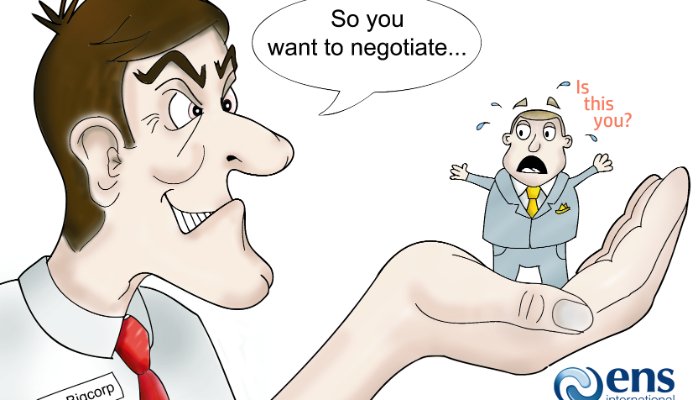How to Negotiate Contracts With More Powerful Parties
Do you ever have to negotiate contracts with organisations that have considerably more negotiating power than you do?
These organisations often get their power from having great Best Alternatives Elsewhere (BAEs). This may be because if you walk away from your contract negotiations with them it will not make much difference to that organisation, or they may know that it would be very hard or impossible for you to totally walk away from the negotiation.
Two situations I was involved with recently:
1. Negotiating contracts with a global brand
My client was negotiating with a global brand. The brand was being very demanding and historically had been very demanding. My client accounted for only about 7% of the brand’s UK supply.The brand had three people dedicated to the relationship with my client. These three people came to every negotiation/meeting.
My client was getting increasingly frustrated by the domineering attitude of the brand and even though they had accommodated the brand’s past requests, their demands were getting bigger and more onerous. My client did not know what to do. They had no option but to comply with the demands because their customers expected them to sell the brand, but they could not keep giving these concessions.
2. Negotiating contracts with a sole supplier
My client could only go to one supplier for this huge contract. The supplier knew this and was being very demanding and secretive.My client was very concerned that they would get a very expensive and poor value-for-money product from the single source supplier. They felt that the supplier was abusing their position. The bullish and secretive nature of the supplier was making my client feel that they were being treated unfairly, would be deceived and end up paying much more than they needed to. And there was very little they could do about it.
How to negotiate contracts with more powerful other parties
It may be true (and reinforced or exaggerated by the other organisation) that the other party has better content power, but the wonderful news is that we don’t negotiate with organisations we negotiate with individuals. They may be representing their organisations, but they are people. And this is where Process Step 1 of the ENS International psychological negotiation model comes in. People are most strongly motivated by their personal needs and their decisions are mostly made to satisfy their personal needs.
So while the organisation may have great BAEs (best alternatives elsewhere) we ask you to consider the best alternatives of the individuals.
- How easy would their life be if you walked away from this negotiation, or delayed it, or made it difficult; what would they have to do to be in the same position with another party?
- What would their organisation think of them if you walked away?
- What would happen if this negotiation resulted in a reluctant agreement where the implementation will always be fraught with problems?
- What would happen if the negotiation was escalated above them because they could not reach agreement?
Here’s how the two client scenarios played out when tackled with ENS International process solutions:
1. Negotiating contracts with a global brand
My client invested in creating a credible alternative which (although not ideal) could reduce their commitment to the brand by nearly a half. A third party informed the brand of my client’s activities. Losing 3.5% of volume to the organisation was probably not very compelling – having the three relationship managers looking at each other, wondering which one (or two) would lose their job, was very motivating and they started to recognise the value of a collaborative long term approach.The result was a far more collaborative agreement than ever imagined.
2. Negotiating contracts with a sole supplier
This project was of such magnitude that it would be a career defining negotiation for the supplier’s lead project director. With this key person we rehearsed how he would look if this resulted in a mould-breaking long term deal with joint gain outcomes and a strong relationship. We also painted images of what a competitive driven short term outcome may entail in the longer term of this project, including what impact this may have on him as the project started. Some casual “off the record” conversations (negotiations) with the supplier’s key person got him thinking. He realised that what would be best for him was for this to be a co-operative, long-term, joint gain outcome. It would be successful and easy to manage with a willing partner. He used the phrase “this will be held up as a model negotiation” more than once.The negotiations became far more open with a free flow of information between them. The result was an excellent joint gain outcome both in the short and long term.

